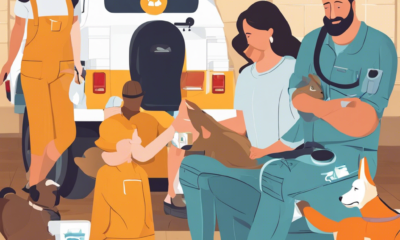Adoption
How to Help a Rescue Pet Adjust to Their New Home

Bringing a rescue pet into your home is an incredibly rewarding experience, but it can also come with challenges as your new furry friend adjusts to their fresh start. Pets from shelters often have unique backgrounds and past experiences that shape their behaviors and personalities, so providing them with extra love, patience, and understanding is key. Here are some useful tips to help your rescue pet settle in and feel comfortable in their new forever home.
Create a Safe and Cozy Space
Preparing a dedicated area for your rescue pet is crucial in making them feel secure. Set up a cozy bed or crate in a quiet corner of your home, ensuring it’s away from high-traffic areas. Fill this space with soft blankets, toys, and perhaps a piece of your clothing with your scent on it, which can provide familiarity and comfort. Respect their personal space and allow them to retreat to this area when they need some alone time.
Establish a Routine
Animals thrive on predictability, so establishing a daily routine is vital. Consistent schedules for meals, walks, playtime, and bedtime will help your rescue pet understand what to expect and feel more at ease. Make sure to feed them at the same time each day and take them out for potty breaks regularly. A structured routine also aids in house training and reduces anxiety.
Go Slow with Introductions
Introducing your rescue pet to new people, pets, or even parts of your home should be done gradually. Overwhelming them with too much too soon can cause stress and potential behavioral issues. Start by allowing them to explore one room at a time, and then slowly introduce them to other areas. When introducing them to new people or pets, supervise closely and ensure these interactions are positive and controlled.
Practice Patience and Positive Reinforcement
Adjusting to a new home takes time, and every pet will do so at their own pace. Be patient and avoid pushing your pet beyond their comfort zone. Reward good behavior with treats, praise, and affection. Positive reinforcement will help your pet understand what is expected of them and build their confidence.
Consider Professional Training or Support
If your rescue pet displays behavioral issues or struggles to adapt, consider seeking professional help. A certified trainer or animal behaviorist can provide valuable guidance tailored to your pet’s specific needs. They can offer techniques to address problematic behaviors and help strengthen the bond between you and your pet.
-

 Training12 months ago
Training12 months agoInquiry Regarding Document Review
-

 Wildlife1 year ago
Wildlife1 year agoEncouraging Wildlife in Your Backyard Safely
-

 Wildlife1 year ago
Wildlife1 year agoProtecting Endangered Species: What You Can Do
-

 Adoption1 year ago
Adoption1 year agoFinding the Right Rescue Organization for Your Family
-

 Training12 months ago
Training12 months agoApple Smartphones in 2024: Revolutionary Features and Why They Dominate the Market
-

 Wildlife1 year ago
Wildlife1 year agoHow Climate Change Affects Wildlife Ecosystems
-

 Wildlife1 year ago
Wildlife1 year agoThe Role of Sanctuaries in Wildlife Protection
-

 Adoption1 year ago
Adoption1 year ago10 Things to Know Before Adopting a Pet
















